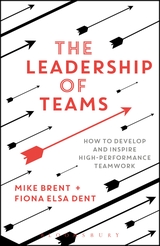The Leadership of Teams
How To Develop and Inspire High-Performance Teams


The authors are adjunct professors at Ashridge Executive Education, part of Hult International Business School. Their academic research and teaching is founded on extensive consulting experience with large organizations worldwide. The pair have collaborated on two leadership guides previously.
Organizations tend to operate in teams – but rarely do those groups stop and consider what makes them a team (as opposed to just a group of individuals). Understanding what makes teams different from working groups, and what motivates them and what disrupts them performing is clearly important if you lead a team and want to get the best out of it.
The authors' research showed that 69% of managers work with five or more teams. So getting team leadership right is important.
The book explores the breadth of aspect that combine to make up teams and teamwork and team leadership. The authors drawn on their extensive knowledge of the sector and highlight the key thinking, much of it quite recent, on best practice.
Looking at the range of leadership styles from dominant 'hero' leaders to the modern 'servant leader', they acknowledge that reality most often lies somewhere between, citing the 2015 'Host Leadership' approach as an ideal model of someone who takes control when required, and steps back when space is needed.
Brent and Dent add a fifth element to Tuckman's team model of 'Forming, Storming, Norming, Performing' and now 'Adjourning', as they recognise that teams are largely temporary in today's complex business environment.
On Trust they leverage Maister's 'Trust Equation' (Trust is the quotient of (credibility x reliability x intimacy) divided by self-orientation (ie selfishness) of the person to be trusted. To which they add 'integrity' and 'honesty'.
The same approach is taken with Engagement, Emotion, Influencing, Accountability and so on – discussing some of the leading thought on the area and then adding their own insights.
The final chapters deal with teamwork barriers rather than the promoters. Conflict, change, politics and derailment.
This book is clearly written by educators. Like so much of organizational and management behaviour the solutions are not that complex to understand – and the authors present the options clearly; but implementation of those best practice behaviours remains an enduring problem – and all leaders should no doubt have recourse to primers such as this on a regular basis, to remind and reinforce their understanding of dealing with teams.
Title: The Leadership of Teams: How To Develop and INspire High-Performance Teams
Author/s Name/s: Mike Brent, Fiona Elsa Dent
Publisher: Bloomsbury
ISBN: 978-1-4729-3587-8
Publishing Date: August 2017
Number of Pages: 265
Author Knowledge Rating: 1-5 (based on their years of experience, academic expertise in subject areas, and exposure to cross-functional thinking in the area)









































































Readability: 1-5 score(1=dense and v academic; 5=frantic; page turner)












































































Appropriate Length: (1=could have been written in 25% of the length;5=could have been longer)












































































Core Idea Value: (1=nonsense (or entirely esoteric); 5=game-changer)











































































